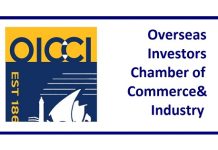As the business community prepares for a countrywide shutter-down strike on July 19 in protest against Sections 37A and 37B of the Sales Tax Act — which grant expanded powers to tax officials — Finance Minister Muhammad Aurangzeb has invited trade and industry representatives to Islamabad for dialogue on Tuesday, urging them to present a well-reasoned case.
Speaking at the Overseas Investors Chamber of Commerce and Industry (OICCI) on Monday, Mr Aurangzeb said: “We will hear the perspective of all chambers and associations and explain the government’s position. I urge business leaders to come well prepared after reviewing the relevant rules and regulations.”
He clarified that the enhanced powers granted to the Federal Board of Revenue (FBR) relate solely to sales tax fraud — not income tax — and will only be exercised in cases involving amounts exceeding Rs50 million. “There is an orchestrated campaign against these provisions despite their approval by the National Assembly following consultations with the finance committee,” he said.
Improved fiscal space
Referring to a recent meeting with the State Bank governor and bank executives, the minister stated that Pakistan’s fiscal space has improved, with reduced borrowing needs and lower debt servicing resulting from government debt buybacks. This, he said, should enable banks to expand lending to the private sector.
He noted that banking activity had already picked up in agriculture and SME financing, and called on banks to now support the government’s privatisation drive. “Privatisation, especially of Pakistan International Airlines (PIA), presents opportunities for the private sector, and banks must collaborate with potential sponsors,” he said.
The Privatisation Commission has been tasked with offloading 24 state-owned enterprises (SOEs), and the finance minister urged financial institutions to assist in reviving sick units as well — a key pillar of the upcoming industrial policy being led by PM’s Special Assistant Haroon Akhtar.
Mr Aurangzeb expressed satisfaction with recent economic indicators and cited OICCI’s latest business confidence survey as evidence of growing optimism. He assured multinational firms that sales tax refund issues would be resolved, revealing that Rs75bn in sales tax refunds had already been paid this month, while $2.3bn in profit and dividend repatriation had been cleared in FY25 so far, compared to $2.2bn in FY24.
He also invited the OICCI leadership to Islamabad for a detailed briefing on the FBR’s transformation, including reforms in people, processes, and technology. He noted that Prime Minister Shehbaz Sharif was personally overseeing weekly meetings to accelerate automation and incentivisation in tax administration.
On inflation and commodity pricing, the minister said the Economic Coordination Committee (ECC) is monitoring price trends monthly. However, he stressed the need to adopt a deregulation framework for sustainable solutions. “There are no significant pricing issues currently in maize or rice, with fresh crops arriving alongside export momentum,” he said.
“We are seeing early signs of macroeconomic recovery. But to break the cycle of repeated crises, Pakistan must make bold, sometimes difficult, decisions,” Mr Aurangzeb said, reaffirming the government’s commitment to a transparent, predictable, and investment-friendly environment.
He highlighted a new simplified tax return form for salaried individuals, now available on the FBR website. “Instead of 800 rows and complex codes, only eight input screens are now required. After this, the focus will shift to small traders and SMEs,” he said.
Responding to OICCI members’ concerns, he pledged the government’s resolve to tackle policy and regulatory bottlenecks and unlock Pakistan’s investment potential.
OICCI President Yousaf Hussain welcomed the improved macroeconomic indicators and the government’s efforts toward stability. “To convert this progress into sustained growth, we must strengthen institutions, build capacity, and ensure consistent policymaking,” he said, calling for the timely execution of a national economic recovery plan with technocratic leadership.
OICCI Secretary General Abdul Aleem emphasised the need to lift foreign direct investment (FDI) — currently below 1pc of GDP — and simplify regulations. “We appreciate the government’s direction, but the exit of some major multinationals highlights the urgency of improving the investment climate for both existing and prospective investors,” he warned.
Read also:
Honda Launches First Locally Assembled HR-V Hybrid in Pakistan, Priced at Rs. 8,999,000
































